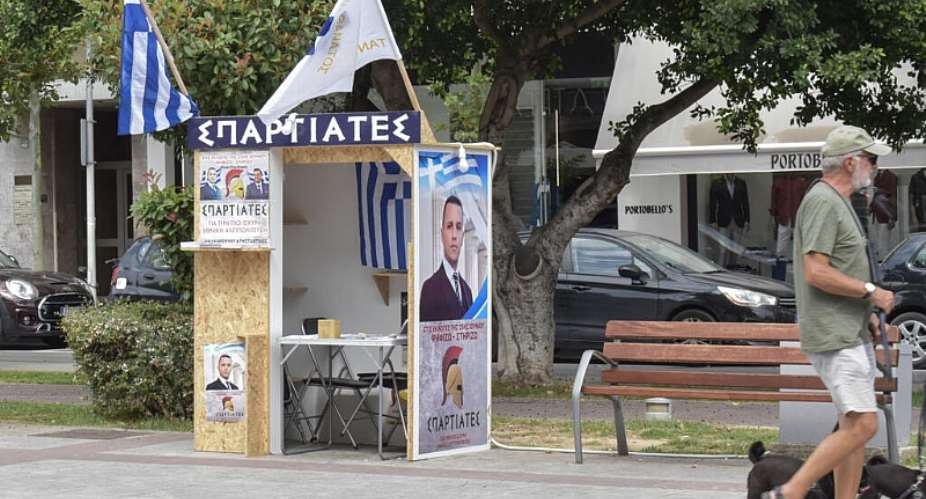The far right has made a dramatic return to Greek politics after general elections on Sunday, while in Germany the AfD party won its first ever district election.
For the first time since the restoration of democracy nearly 50 years ago, three nationalist parties are now in Greece's parliament.
Together, the parties are good for 12.8 percent of the vote, which translates in 34 out of 300 seats in parliament.
Most prominent amongst them are Spartiates (the Spartans) with their warrior helmet logo, who ran their first ever election last Sunday. They only appeared in opinion polls less than three weeks before the vote.
They are backed by Ilias Kasidiaris, the former spokesperson for neo-Nazi party Chrysí Avgí (Golden Dawn,) which was banned from contesting elections after court labelled it a "criminal organisation."
Kasidiaris is serving a 13-year prison sentence with other leading members of Golden Dawn over crimes including the murder of an anti-fascist rapper.
The Spartans won over 240,000 votes and obtained 12 seats in parliament.
Letters of Jesus
A second victory for the extreme right was won by Ellinikí Lýsi (Greek Solution,) a pro-Russia party led by former telesales marketer Kyriakos Velopoulos, winning 230,000 votes, which is also enough for 12 lawmakers.
Velopoulos, whose party first appeared in the 2019 European parliamentary election, used to peddle beeswax as a treatment for hair loss on his television show, as well as letters allegedly written by Jesus Christ.
The anti-abortion Níki (Victory) party, led by theologian Dimitris Natsios, took 10 seats.
Its manifesto included a plan to require immigrants to undergo monthly health, working status and penal record checks. Anyone who failed to comply would be expelled from Greece.
'High treason'
Support for the right-wing parties was to strongest in northern Greece.
They took over 20 percent of the vote in six electoral districts in the northern Macedonia region.
Anger has been simmering there since the signing of the Prespa Agreement by a leftist government in 2018, resolving a quarter-century-long name dispute with neighbouring North Macedonia, with the former Yugoslav republic agreeing to add "north" to its name.
While the agreement with Skopje was hailed in the West, many hardliners in Greek Macedonia viewed it as high treason.
"It is evident that there are significant interconnections among these parties, primarily stemming from their shared stance on the Macedonian dispute and their steadfast refusal to accept the outcome in 2018," Georgios Samaras, Assistant Professor in Public Policy at King's College London, told French press agency AFP.
Meanwhile in Germany, the far-right AfD won its first district election on Sunday, a further boost to the anti-immigration party as it surges to record highs in opinion polls.
Robert Sesselmann, a lawyer and regional lawmaker, came out on top in a closely watched runoff vote for district administrator in Sonneberg in the central state of Thuringia, near the border with Bavaria.
Sesselmann took 52.8 percent of the vote, according to the electoral office.
The victory came despite appeals from mainstream parties for voters to rally behind the incumbent candidate, Joergen Koepper from the conservative CDU.
Thuringia's interior minister Georg Maier, a Social Democrat, was quoted by Bild magazine as saying that the outcome sounded "an alarm bell for all democratic forces."
(With newsagencies)





 Paramount Chief of Gwollu dead
Paramount Chief of Gwollu dead
 TUC tells informal sector employers to pay their employees the minimum wage
TUC tells informal sector employers to pay their employees the minimum wage
 Prof. Marfo urges good civilian-security relations to promote peace
Prof. Marfo urges good civilian-security relations to promote peace
 I was nearly jailed because of NPP; I’m still ‘pained’ — Hopeson Adorye
I was nearly jailed because of NPP; I’m still ‘pained’ — Hopeson Adorye
 Rising against NPP after being a minister for 15 years is a sin; God will judge ...
Rising against NPP after being a minister for 15 years is a sin; God will judge ...
 Cecilia Dapaah: Reasons behind AG’s advice to EOCO not grounded in law – Martin ...
Cecilia Dapaah: Reasons behind AG’s advice to EOCO not grounded in law – Martin ...
 NPP should have reported Kingsley Nyarko’s conduct to police – Inusah Fuseini
NPP should have reported Kingsley Nyarko’s conduct to police – Inusah Fuseini
 Akufo-Addo cuts sod for MIIF Technical Training Centre
Akufo-Addo cuts sod for MIIF Technical Training Centre
 NPP didn’t struggle to win Ejisu by-election – Samuel Ayeh-Paye
NPP didn’t struggle to win Ejisu by-election – Samuel Ayeh-Paye
 Naa Ayemoede returns to school
Naa Ayemoede returns to school
